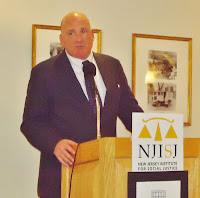On Tuesday, December 11, I attended a graduation ceremony for 14 young people who went through a program that impressed me as delivering on exactly these promises. The course was offered by the New Jersey Institute for Social Justice in Newark, N.J.
The graduation ceremony included 30 people (of all ages) from the families of the students and a dozen people involved in the program, which has corporate as well as government support. The students were graduating from the Metro Newark Brownfields Training Program, which offers a combination of life skills, academic and highly technical training for careers in remedying brownfields – i.e., land and buildings declared toxic and unfit for habitation.
The graduation ceremony included 30 people (of all ages) from the families of the students and a dozen people involved in the program, which has corporate as well as government support. The students were graduating from the Metro Newark Brownfields Training Program, which offers a combination of life skills, academic and highly technical training for careers in remedying brownfields – i.e., land and buildings declared toxic and unfit for habitation.
 |
Kenneth Lucianin, Commissioner,
Passaic Valley Sewerage
Commission.
|
Like a good shepherd, the Institute's Director of the Workforce Development and Training, Albert Williams, knows each one of his flock. At the graduation ceremony in the New Jersey Historical Society in Newark, he good-naturedly described each of the trainees, from the super-eager one who arrived an hour early each day of class to the one who was a Doubting Thomas, disbelieving in the possibility that a job would await him at the end of the program.
 |
| Michael DeFrancisci, Executive Director, Passaic Valley Sewerage Commission. |
Studies of training programs have turned up widespread evidence of low placement rates. But the brownfields training program has been a huge success by this criterion, with the enrollment of 33 men and women and a placement rate of 92 percent.
In addition to taking the course, students must take EPA tests to be certified as brownfields workers in each specific area. Two of the speakers at the ceremony were from a major employer of brownfields workers and they spoke enthusiastically of the need for workers with the skills offered, and the certifications obtained, by the brownfields training program.
The speakers (whose photos appear above left) were Kenneth Lucianin, Commissioner of the Passaic Valley Sewerage Commission, and Michael DeFrancisci, Executive Director of the Commission. They projected that the demand for graduates will grow quickly with Superstorm Sandy's remediation needs, on top of the steady supply of New Jersey Superfund sites that can be developed once they have been appropriately remediated.
In addition to taking the course, students must take EPA tests to be certified as brownfields workers in each specific area. Two of the speakers at the ceremony were from a major employer of brownfields workers and they spoke enthusiastically of the need for workers with the skills offered, and the certifications obtained, by the brownfields training program.
The speakers (whose photos appear above left) were Kenneth Lucianin, Commissioner of the Passaic Valley Sewerage Commission, and Michael DeFrancisci, Executive Director of the Commission. They projected that the demand for graduates will grow quickly with Superstorm Sandy's remediation needs, on top of the steady supply of New Jersey Superfund sites that can be developed once they have been appropriately remediated.
Schenine Mitchell of EPA Region 2, participated in awarding certificates and spoke to the group glowingly of the brownfields training program. The program combines training in basic education and technical sophistication with an emphasis on strong mutual support among members of each class after they leave the Institute.
My observation of the interaction among the graduating class and their instructors leaves me with a very good feeling about the human side of the training. As Mr. Williams said:
We don't care a whole lot about what you did and where you came from before you came to us. We care where you are going and how you are going to get there.I suggest that the people who are disappointed with what Brooklyn ex-offenders are getting in the way of training and support go see what the New Newark is delivering.


No comments:
Post a Comment